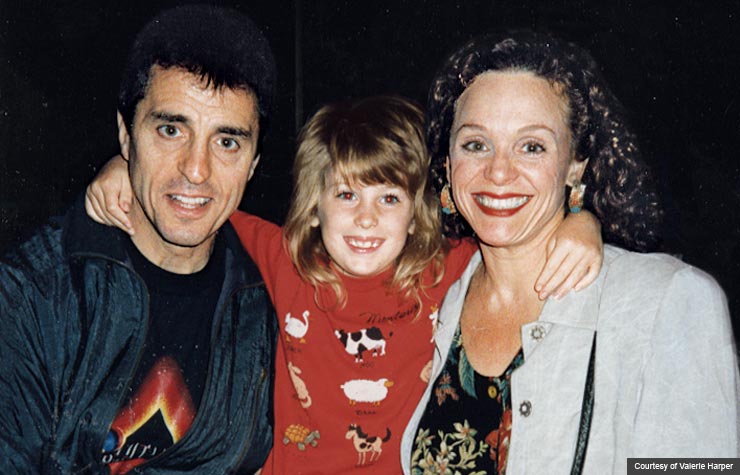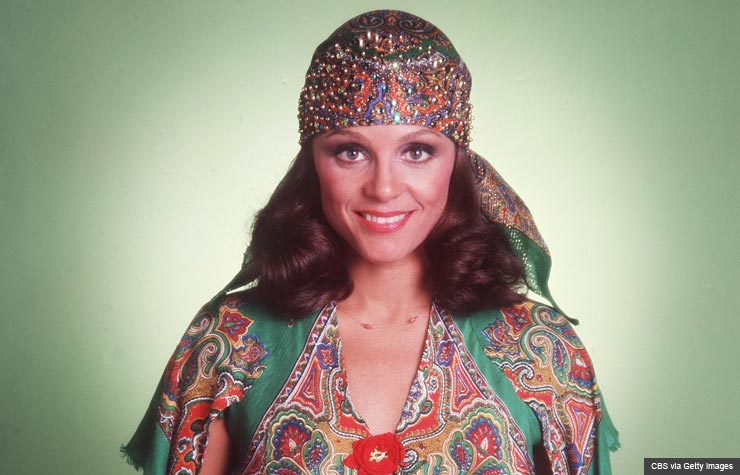AARP Hearing Center
Valerie Harper is sitting on a rose-colored sofa in the living room of her Spanish-style Santa Monica home, her life reflected in the things that surround her. On one wall hangs a modern, colorful painting of her TV alter ego, Rhoda Morgenstern, in trademark '70s head scarf, and there are photos on every shelf of her husband, daughter and five stepchildren. A dining table is piled high with letters and gifts from admirers — flowers, a prayer shawl, a set of rosary beads.
In that familiar, full-throated voice we remember from her role as Mary Tyler Moore's on-screen BFF, the 74-year-old four-time Emmy-winning actress says, "I have been so touched by the outpouring of love and support and suggestions."
Recalling how in January she was diagnosed with terminal metastatic lung cancer, she admits to having been initially terried. "I'd wake up every morning with the feeling of a hand clutching my throat," she says. "I'd think, 'God, I have cancer. I won't be around to see my daughter get married.'"
More About Valerie
Don't miss the behind-the-scenes video (above) of AARP's visit with Valerie Harper. Also, check out our slideshow of fun photos from Harper's career.


Harper quickly realized that she and her husband of 26 years, Tony Cacciotti, 74, needed to get their affairs in order. "Tony said he didn't want to discuss it," says Harper. The son of Italian immigrants, Cacciotti had as a child seen too many deceased relatives, including his own teenage brother, displayed in caskets in the family living room during wakes that lasted as long as three days. "He has a whole phobia about the coffin and death," Harper explains. "He doesn't go to funerals."
Drawing on her emotional reserves, and philosophies she adopted earlier in life, Harper not only came to terms with her diagnosis but also helped her husband with his fears. "Valerie is a realist," says Cacciotti. "And she worries more about others than herself. She worries about what's going to happen to us when she's gone."
After some coaxing, Cacciotti agreed to see a lawyer to draft wills and health care directives, something the couple admit they should have done years ago. But when Harper told her husband that she wanted to be cremated, he dug in once again.
"The body is just a rooming house," Harper says. "I don't care. I said, 'Go cheap. Go to the Neptune Society [a low-cost national provider of cremation services].' A friend went that way, and it was fabulous. You go out in Santa Monica Bay, cast flowers, then the ashes. Something even came in the mail offering a $120 discount. I said, 'Tony, we can get it if we order by Thursday.' I was trying to make him laugh, but he didn't think it was funny."


Finally Cacciotti came clean with Harper about his reluctance. "I wanted to be buried next to her," he recalls quietly. "That meant I had to muster my fear and deal with the cemetery thing."
See also: The AARP Brain Health Center
So it was that one afternoon in June, the couple paid a visit to Hollywood Forever, located smack in the middle of Tinseltown, where folks like Rudolph Valentino and Cecil B. DeMille have been laid to rest. There's plenty of green, and the place hosts a classic film series frequented by twentysomethings who come with coolers and blankets.
Although Cacciotti refused to enter the main funeral home, he toured the property by golf cart. After the management assured him that a bench could be placed graveside so he could sit and visit Harper until both were in the ground, the couple signed up for a double plot. Says Harper, "We have a fabulous view of the Hollywood sign!"
As it turns out, Harper had visited the cemetery decades ago.
The actress, who started her career as a dancer, took ballet lessons in 1950 at a studio near Hollywood Forever; she and a girlfriend once spent an afternoon strolling its gardens. She now could not be more enthusiastic about it being her final resting place: "They've got peacocks," she says. "They're tame and come right up to you."
From her living room couch, Harper imitates the peacock cry in high volume: "Ahhhhhhhhryaa! Ahhhhhhhryaa! And then they open up their enormous tails. It's a life-giving place."































































More on Entertainment
Gloria and Emilio Estefan Have Rhythm — and Lots of Romance
Gloria and Emilio Estefan fled Cuba as youngsters. Five decades later, the music icons revel in hard work, and the power of love.
Marilu Henner Has an Incredible Memory
Unable to forget anything, the actress is a consultant on (of course) the crime drama "Unforgettable"